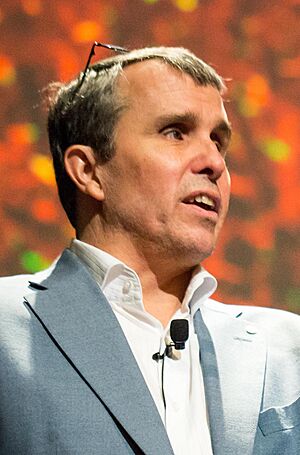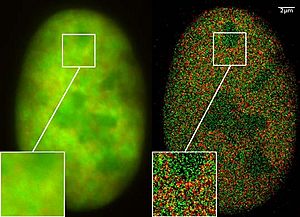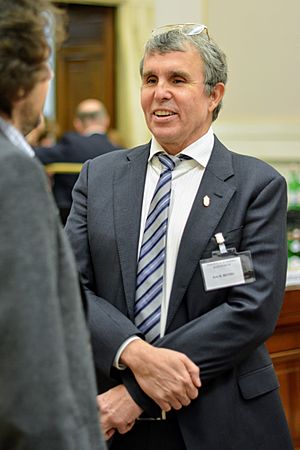Eric Betzig facts for kids
Quick facts for kids
Eric Betzig
|
|
|---|---|

Betzig in 2015
|
|
| Born |
Robert Eric Betzig
January 13, 1960 Ann Arbor, Michigan, U.S.
|
| Alma mater | |
| Known for | Photoactivated localization microscopy Lattice light-sheet microscopy |
| Spouse(s) |
|
| Children | Cayden, Ravi, Max, Mia, Zoe |
| Awards |
|
| Scientific career | |
| Fields | Applied physics |
| Institutions | Howard Hughes Medical Institute University of California, Berkeley |
| Thesis | Near-field Scanning Optical Microscopy (1988) |
| Doctoral advisor | Michael Isaacson |
Eric Betzig, born on January 13, 1960, is an American physicist. He teaches physics and cell biology at the University of California, Berkeley. He also works as a senior researcher at the Janelia Farm Research Campus in Ashburn, Virginia.
Dr. Betzig is famous for his work on fluorescence microscopy, especially a method called photoactivated localization microscopy. This special type of microscope lets scientists see tiny things in much greater detail. In 2014, he won the Nobel Prize in Chemistry. He shared the award with Stefan Hell and William E. Moerner for making "super-resolved fluorescence microscopy" possible. This invention helps us see inside cells like never before!
Contents
Early Life and Education
Eric Betzig was born in Ann Arbor, Michigan, in 1960. His father, Robert Betzig, was an engineer. Eric loved the idea of working in the aerospace industry when he was young.
Studying Physics
He studied physics at the California Institute of Technology. He earned his first degree there in 1983. After that, he went to Cornell University. His supervisor was Michael Isaacson, and he also worked with Aaron Lewis.
At Cornell, he earned two more degrees in applied physics. He got his Master's degree in 1985 and his PhD in 1988. For his PhD, he focused on making very powerful optical microscopes. He wanted to see things smaller than the usual limit of 0.2 micrometers.
Eric Betzig's Career
Working at Bell Laboratories
After finishing his PhD, Betzig started working at AT&T Bell Laboratories in 1989. This was a famous research center. In the same year, his colleague, William E. Moerner, created a microscope that could see past the 0.2 micrometer limit. This limit is known as the Abbe limit. However, Moerner's microscope only worked in extremely cold conditions, near absolute zero.
Inspired by this, Betzig made a big breakthrough in 1993. He was the first person to take pictures of individual fluorescent molecules at room temperature. He could figure out their exact positions within less than 0.2 micrometers. For this amazing work, he received the William O. Baker Award for Initiatives in Research. He also won the William L. McMillan Award in 1992.
A Break from Science
In 1994, Betzig felt tired of the academic world and the changes happening at Bell Laboratories. He decided to leave science for a while. He spent some years at home, taking care of his children.
In 1996, he returned to work at Ann Arbor Machine Company. This company was partly owned by his family. He worked on a new technology there, but it didn't become very successful.
Returning to Microscopy
In 2002, Eric Betzig decided to go back to his passion: microscopy. He started a new company called New Millennium Research. He was inspired by Mike Davidson's work with glowing proteins.
Betzig then developed a new method called photoactivated localization microscopy (PALM). This method uses quick flashes of light to create incredibly clear images. These images were much sharper than what was thought possible before. He and his old colleague, Harald Hess, built the first microscope using this new technology in just two months. This invention quickly got a lot of attention.
In October 2002, the Howard Hughes Medical Institute hired him to work at their Janelia Farm Research Campus. He officially joined Janelia in early 2006. There, he continued to develop super high-resolution fluorescence microscopy techniques. He used these techniques to study how human embryo cells divide.
In 2014, Eric Betzig, along with Stefan Hell and William E. Moerner, received the Nobel Prize in Chemistry. This award recognized their groundbreaking work in making super-resolved fluorescence microscopy possible.
In 2016, Pope Francis appointed him an Academician of the Pontifical Academy of Sciences. In 2017, Betzig joined the faculty at Berkeley. He also works at the Lawrence Berkeley National Laboratory.
Personal Life
Eric Betzig has been married twice. His first wife was physicist Ruby Ghosh. They have two sons, Cayden and Ravi. His second wife is biophysicist Na Ji. They have three children: Max, Mia, and Zoe.
See also
 In Spanish: Eric Betzig para niños
In Spanish: Eric Betzig para niños
 | Emma Amos |
 | Edward Mitchell Bannister |
 | Larry D. Alexander |
 | Ernie Barnes |



